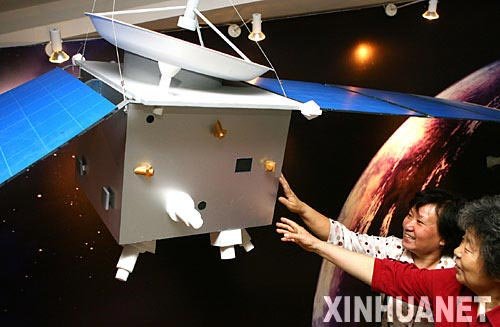Mars probe prepares for launch
 0 Comment(s)
0 Comment(s) Print
Print E-mail
China Daily, October 21, 2011
E-mail
China Daily, October 21, 2011
China's first Mars probe will be launched between Nov 8 and Nov 20, after being delayed for two years, a top scientist said.
 |
|
The model of China's first Mars probe, Yinghuo-1,?was seen at China International Aviation and Aerospace Exhibition in Zhuhai in 2010. [Xinhua] |
Yinghuo-1, a micro-satellite weighing 110 kilograms, will be sent into space with Russia's Phobos-Grunt mission at the Baikonur Cosmodrome launch site in Kazakhstan.
The probe is expected to enter a preset orbit around Mars between August and September next year, said Wu Ji, director of the National Space Science Center under the Chinese Academy of Sciences.
China News Service, citing the Russian Federal Space Agency, said the launch will be on Nov 9.
Experts said the project is expected to lead China further into deep space exploration, following two successful lunar probe projects since 2007.
Wu, who has designed scientific goals for the project with his colleagues, said Yinghuo-1 has been safely transported to the launch site, and a check showed everything is fine.
The mini-satellite's scientific goals include exploring Mars' space environment, and relaying back the first images of Mars taken by a Chinese satellite.
"Human beings now have only limited knowledge of Mars' upper atmosphere," he explained.
On board the probe are a magnetometer to explore Mars' magnetic field, a device to explore its upper atmosphere, and two cameras to take photos of the Red Planet for studying dust storms and their impact on the upper atmosphere, he said.
Russia's Phobos-Grunt mission will land on the Martian moon Phobos, collect geological samples and return them to Earth in three years.
The mission was set for October 2009, but later postponed to this year to enhance the reliability of the project. Russian space officials explained in 2009 that scientists needed more time to study Phobos' surface and design better facilities to collect soil samples from Phobos.
Earlier reports said Yinghuo-1 will travel 350 million kilometers in 11 months before separating from the Russian landing craft to enter the planet's orbit. It is expected to circle around the planet for one year.
Pang Zhihao, deputy editor-in-chief of the monthly Space International, said that it is difficult to maneuver the satellite into orbit.
"If the timing of the maneuvers are not right, or the probe's speed is too fast or too slow, the satellite could possibly fail to be captured by the planet and miss the orbit," he said, adding maneuvering a Mars probe that far is extremely demanding.
Only the European Space Agency has succeeded in sending a probe into orbit around Mars in one shot. Mars probe projects by the United States and Japan have all encountered failures, he said.
Without a deep space network to monitor and control interplanetary spacecraft, China relies on Russian facilities for its first Mars probe project, he said.
China is expected to complete a deep space network by 2016, including two domestic monitor and tracking stations and a third in South America, Qian Weiping, a top scientist in the field, said earlier.
"With the network ready and a powerful launch vehicle, China will conduct its next Mars exploration in the future on our own," said Wu Ji, adding the academy has started to research scientific goals and devices on board for the future Mars explorations.
Topics of interest to scientists across the world include whether there was once life on Mars and how its atmosphere took shape.





